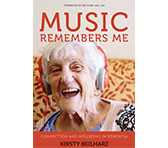18 May 2017
Music Remembers Me
New book about music, connection and wellbeing in dementia

Kirsty Beilharz's new book Music Remembers Me aims at helping family, carers and friends of people living with dementia to enjoy music with their loved ones, and to understand the multiple ways music can be useful - from reducing pain and relieving stress to helping with everyday routines, motivating movement and creating meaningful moments.
I joined HammondCare as the Director of Music Engagement a few years ago, and discovered that the organisation has an adventurous, progressive flare for innovation and translating new ideas into practice. This spirit has seen everyday life in nursing homes transformed by an excellent food culture, new design that helps residents, and even assistance dogs for people with dementia, and applying virtual reality tools to understanding the dementia experience. It is also this spirit that enabled us to pioneer a program of individualised music on iPods for over 700 residents, participatory music in singing, playing and dancing groups, and the invention of new instruments for people with dementia in collaboration with the University of NSW's Art and Design Master's Degree students.
Music therapy and music at the bedside have a long heritage. The inspiration behind the music engagement programme in residential care, community care, and, now, palliative care, is to make music available every day and at any time, when people most need it - for distraction and reduction of pain, to facilitate mealtimes and bathing, or overcome the stress of visitors, alleviate 'agitation', stimulate appetite, motivate movement and exercise, and to provide timely meaningful moments listening to music with family and friends. The impact of music is not contingent upon memory or speech: music affects the whole brain, in visceral, palpable, emotional, somatic and intellectual ways, and the emotional connection transcends even advanced dementia. This is music as life-quality enhancement, not 'treatment' or an intermittent intervention. We are really trying to convey that music as an integral lifestyle choice brings joy and relief that goes beyond the possibilities of sporadic, targeted therapy appointments.
Music Remembers Me - Connection and Wellbeing in Dementia is written for carers supporting people living with dementia: spouses/partners, loved ones, daughters, sons; the pastoral and social workers; home carers in the community; care staff in nursing homes; and friends. The aim of this book is to put in carers' hands both practical ways to enjoy music with the people they love, and some of the background from science and experience that helps understand the experience of a person with dementia holistically. This book recognises that you don't need to be an expert in either music or technology to use music to enhance someone's wellbeing. And for musicians, they can use their skills responsively as a gift, not a performance, to connect with people.
In particular, we can adapt music for different cultural and belief backgrounds. The positive effect of music in ageing, from brain plasticity, and triggering reminiscence, to creating meaningful shared experiences in dementia, is really starting to gain traction in the media as medical scientists and others voice their corroboration. I was surprised to find that there is no previously written book intended to help people care, without specialist knowledge. So this book aims to facilitate creating shared moments of connection, empathy, emotional relationship and practical love for anyone.
The title, Music Remembers Me (inspired by a song heard on the radio: a song by Beccy Cole and Libby O'Donovan that recognises the joy that music can bring to an older person) alludes to two ideas. Firstly, music can stimulate reminiscence: people may remember words in the context of songs even if they don't have conversation, and music often prompts more lively interaction. Playing music that evokes a person's life, interest and communities also serves to rediscover and strengthen their identity if someone can't express himself or herself. Dementia is often described as a disease of selfhood or loss of identity and personhood (e.g. by Donna Cohen and Oliver Sacks), such that expressing individuality, reinforcing identity, and preserving a 'voice' and identifying traits, quirks, pleasures, hobbies, interests and important features, is even more essential when verbal communication begins to fade. That role of preserving individual identity and personhood - being valued and belonging - may be carried by friends, family and staff where someone is not able to do it themselves. Music can usefully tell personal stories.
But the real heroes of this book, the people from whom I've learned and whose short stories are dotted throughout the book, are the beautiful people living with dementia that I have met through our music engagement program across NSW, and now expanding in Victoria. We have seen joy, tears, karaoke, dancing, story-telling, and learned personal histories prompted by listening to music together. People without words have begun to speak again, people have found rest and peace amidst 'agitation', teeth-grinding, calling out and other indications of anxiety. People who are withdrawn and socially isolated open up and express themselves. Staff erupt with ebullient smiles when the people we care for respond with joy and accomplishment.
> For more information, videos, or to order a copies, please see: musicremembersme.com
© Australian Music Centre (2017) — Permission must be obtained from the AMC if you wish to reproduce this article either online or in print.
Comments
Be the first to share add your thoughts and opinions in response to this article.
You must login to post a comment.